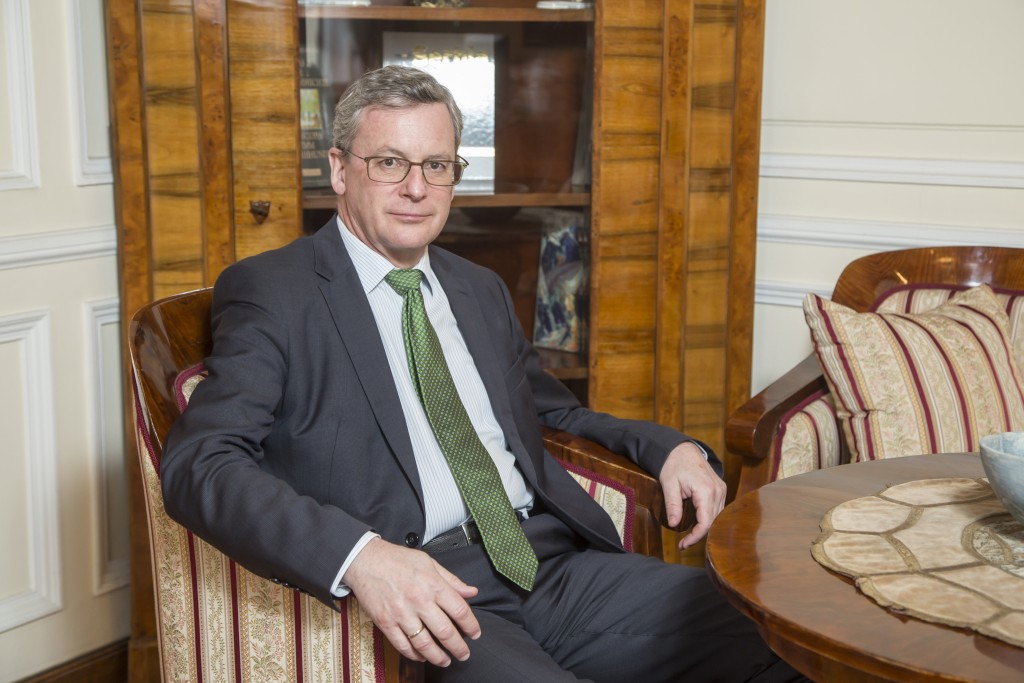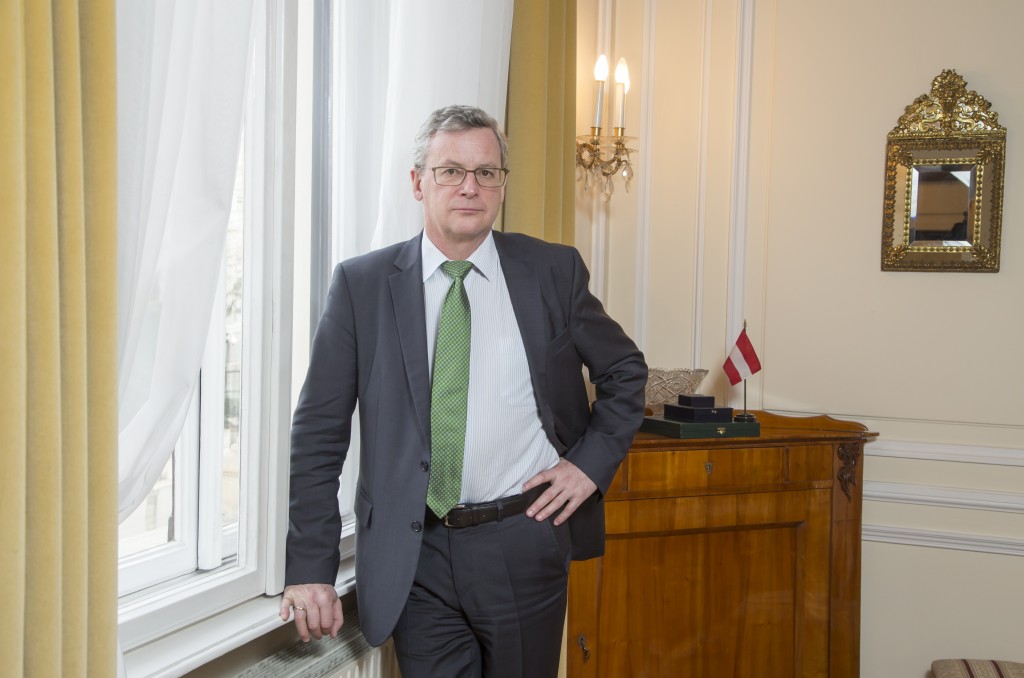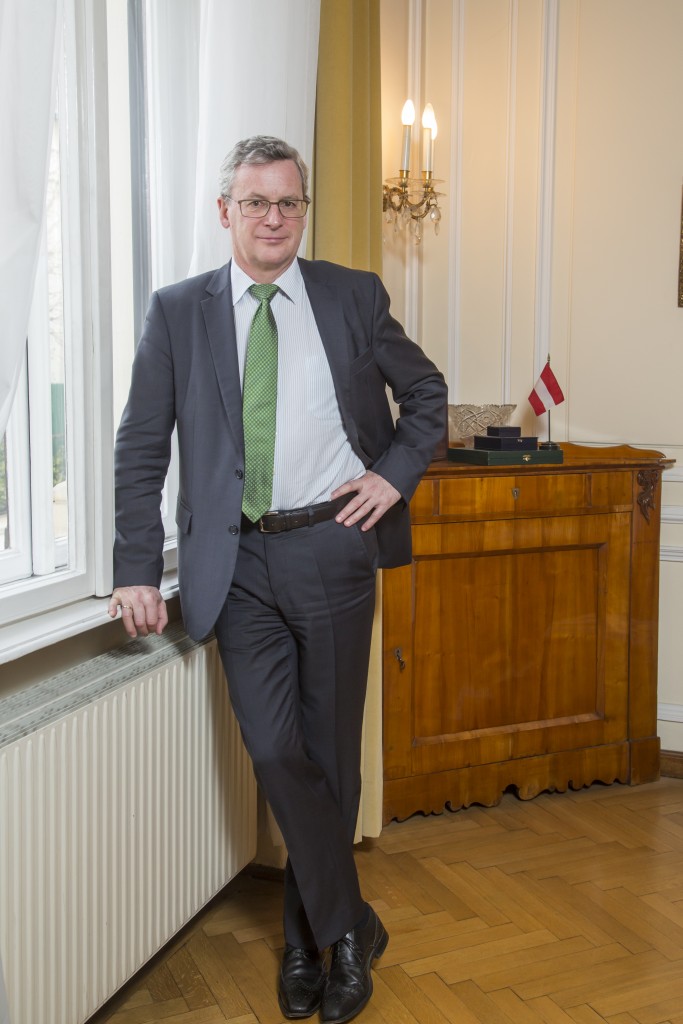When it comes to the EU accession process, a strong sense of determination is perhaps Serbia’s single most important achievement of the last four years. After the likely opening of chapters 23 and 24, the new government should devote its utmost attention to introducing the rule of law as sine qua non of a prosperous and pluralistic society

foto Boško Karanović
H.E. Ambassador of the Republic of Austria to Serbia Johannes Eigner is a diplomat with a long-standing career and a profound knowledge of EU processes. Prior to arriving in Belgrade in 2012, he served in the Department for EU-Enlargement; ENP, EU and Economic Relations to Eastern and Southeast European countries within the Austrian Foreign Ministry, where he soon became head of department. From 2008 he also served as Deputy Director General for Economic Affairs and European Integration. As such, his opinions regarding the progress so far achieved by Serbia in the EU accession negotiation process deserve special attention.
In this interview for D&C, he emphasises a strong sense of determination as perhaps Serbia’s single most important achievement since it embarked on the road to European Union membership. He is an optimist when it comes to the process of opening chapters 23 and 24, which could be followed by the opening of other chapters that have no opening benchmarks.
He also comments here on the Belgrade-Pristina negotiation process, and the role of the two chambers of commerce, which – with the help of the Austrian Federal Economic Chamber – have engaged very pragmatically in joint activities, as well as addressing the effects of the Action Plan signed recently by Austria and Serbia, especially in terms of economic cooperation, which places a specific emphasis on the exchange of knowhow and the introduction of new learning and training methods.
He emphasises that Serbia still needs to take decisive steps towards introducing the dual education system, as one of prerequisites for attracting foreign partners and establishing international business cooperation.
“Of course, another prerequisite is a reliable and predictable legal, regulatory and judicial framework for doing business,” says ambassador Eigner, once again emphasising the importance of the rule of law for every aspect of society’s progress.

H E Ambassador of Austra Johannes EIGNER
foto Boško Karanović
A new ambitious agenda for 2016 was established with the recent visit of Austrian Foreign Affairs and Integration Minister Sebastian Kurz. How does that impact on daily diplomatic dealings on the ground?
It clearly gives a boost to yet more focused work and yet broader contacts. And it is rewarding to see and experience how much our Serbian counterparts appreciate this strong Austrian engagement.
H E Ambassador of Austra Johannes EIGNER
foto Boško Karanović
In your opinion, how is the new regime for dealing with migrants heading along the Balkan route to Austria and Germany functioning so far when it comes to cooperation with Serbia’s authorities?
We are very satisfied that Serbia has joined the common effort to supress the irregular flow of migrants and refugees along the Balkan route, thereby helping to come to terms with a situation that was threatening to become unmanageable if it continued unabated. Austria simply could not have accepted another 90,000 asylum seekers, as it did in 2015.
As a diplomat who has amassed vast knowledge of the EU enlargement process during previous postings, how would you assess Serbia’s progress in this regard during the last four years?
In this last four years we have actually seen Serbia embark, definitely and concretely, along the road towards membership in the European Union – moving from intention to determination. I see precisely this strong sense of determination as perhaps the single most important achievement.
Do you think it is realistic to expect some other chapters to be opened in 2016?
If chapters 23 and 24 are opened (and I see no reason why this should not happen) there are good chances for more chapters to be opened during the course of 2016. We have a whole series of chapters for which no opening benchmarks have been set, and for which Serbia is certainly ready to submit its negotiating position. In some of them – like education and culture or science and research – the acquis communautaire, i.e. the set of EU rules and obligations to adopt, is very limited, so it should not be problem at all to proceed with their opening.
What do you see as the most important tasks of the new government to be formed after the elections, in terms of EU accession and reform?
In the very near future we expect the opening of the most crucial chapters in the negotiating process – chapters 23 and 24 – and for any new government this will mean devoting the utmost attention to concrete improvements in the way the state functions – not any state, but a state firmly based on the rule of law and democratic principles, in which a pluralistic society can prosper.
After embracing Austria’s experience of dual education, what can Serbia learn from Austria’s expertise in public administration?
I wouldn’t say that we are already there when it comes to embracing that specific Austrian experience. First of all some decisive steps still need to be taken for a dual education system to be introduced in Serbia and, secondly, it is not about merely applying a blueprint, which would be too simplistic an approach that could quickly lead to frustration. And this holds true for other transfers of experiences – the art lies in adopting the core of certain schemes and guiding principles, while adapting tangible implementation to specific needs and circumstances.
Is it easier today for you to relay messages related to the importance of negotiations with Kosovo within the EU accession agenda than it was for your predecessor?
We now have a very clear framework for moving ahead with the comprehensive normalisation of relations between Belgrade and Priština, in the form of a practically institutionalised dialogue embedded in the accession negotiation process. So, even if the “chapterisation” of a matter like this was new and far from routine, the message is very clear: if Serbia and Kosovo want to move ahead on their respective paths towards the EU, they have to move ahead with normalising their relations.
To what extent can good relations between the Serbian and Kosovo chambers of commerce, as well as better economic ties between the two countries, push that dialogue forward and ease deliberations regarding future relations?
As is often the case, economic contacts and business cooperation are ahead of politics, and so the two chambers, also with the help of the Austrian Federal Economic Chamber, have engaged very pragmatically in joint activities. The creation of such a business-like atmosphere can only benefit broader normalisation.
What could the Action Plan signed by Austrian Foreign Minister Kurz and Serbian Prime Minister Vučić bring in terms of further advancing economic relations?
This Action Plan – which otherwise goes well beyond economic cooperation – places a distinct emphasis on the exchange of knowhow and the introduction of new methods of learning and training. Innovative, well-trained entrepreneurs are themselves more likely to attract foreign partners and establish international business cooperation. Another prerequisite for improved cooperation is, of course, a reliable and predictable legal, regulatory and judicial framework for doing business.
How do you see the role of the Serbian diaspora in Austria as a factor for strengthening bilateral relations?
Human factors are always key to the relations between two countries, and this factor is particularly strong in relations between Austria and Serbia. More than 100,000 people with Serbian citizenship live in Austria, while the number of those with a Serbian family background is considerably higher. As this year marks precisely 50 years since Austria first invited “Gastarbeiter” from the then Yugoslavia, it is appropriate to remind everyone that those people contributed greatly to the enormous economic development and unseen rise of well-being in post-war Austria.
